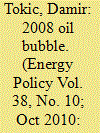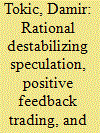| Srl | Item |
| 1 |
ID:
098654


|
|
|
|
|
| Publication |
2010.
|
| Summary/Abstract |
We argue that "the 2008 Oil Bubble" was directly and indirectly created by the Federal Reserve in response to deflationary risks that resurfaced after the housing bubble burst and the resulting credit crisis of 2008. Deflationary risks first appeared after the dot.com bubble burst in 2000 and after the terrorist attacks on September 11, 2001. Manipulation of the US dollar value has been one of the key emergency tools in the Fed's arsenal. During the entire period from 2000 to 2008, the US dollar has been falling, while the price of crude oil has been rising, with the culmination in July 2008. If other global central banks embrace the Fed's anti-deflationary strategies, the consequences could be dire for the global economy, potentially resulting in an ultimate gold bubble.
|
|
|
|
|
|
|
|
|
|
|
|
|
|
|
|
| 2 |
ID:
103338


|
|
|
|
|
| Publication |
2011.
|
| Summary/Abstract |
This article examines how the interaction of different participants in the crude oil futures markets affects the crude oil price efficiency. Normally, the commercial market participants, such as oil producers and oil consumers, act as arbitrageurs and ensure that the price of crude oil remains within the fundamental value range. However, institutional investors that invest in crude oil to diversify their portfolios and/or hedge inflation can destabilize the interaction among commercial participants and liquidity-providing speculators. We argue that institutional investors can impose limits to arbitrage, particularly during the financial crisis when the investment demand for commodities is particularly strong. In support, we show that commercials hedgers had significantly reduced their short positions leading to the 2008 oil bubble-they were potentially aggressively offsetting their short hedges. As a result, by essentially engaging in a positive feedback trading, commercial hedgers at least contributed to 'the 2008 oil bubble'. These findings have been mainly overlooked by the existing research.
|
|
|
|
|
|
|
|
|
|
|
|
|
|
|
|